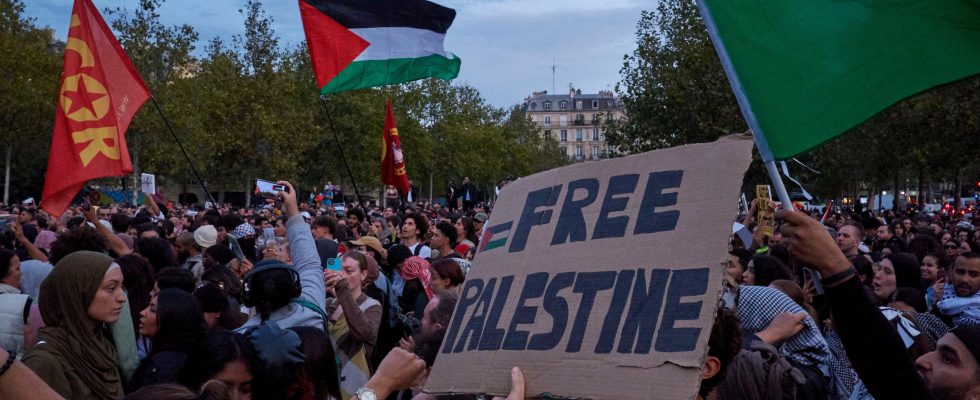No pro-Palestinian demonstrations permitted. The instruction passed by Gérald Darmanin on Thursday, October 12, is intended to be clear: the prefects are invited to prohibit any gathering in support of the Palestinians and to question the organizers and the troublemakers. Several associations, such as France-Palestine Solidarité, have already announced that they are giving up calling for demonstrations in the coming days. However, a few rallies have been held in recent days, most often at the initiative of groups linked to the far left, one of the four branches of French support for Palestine, recalls Marc Hecker, researcher at Ifri, editor-in-chief of Foreign politic and author of the book French intifada? On the import of the Israeli-Palestinian conflict, taken from his thesis and released in 2012. The intellectual anticipates, in light of the activism seen since the beginning of the 2000s, what the militant reactions could be in the coming weeks.
L’Express: Since the Hamas attack in Israel, we have only talked about the possible “importation” of the conflict into France. What do we mean by this expression?
Marc Hecker: This expression developed at the start of the second Intifada to designate the resonances – particularly violent – of the Israeli-Palestinian conflict in France. The violence in question mainly took the form of anti-Semitic acts: tagging, threats, damage to or burning of community buildings, physical attacks. Since then, we have observed an increase in anti-Semitic acts with each resurgence of the Israeli-Palestinian conflict, in 2009 or 2014, for example. We also note that the longer an Israeli operation lasts and the more Palestinian victims there are, the greater the risk of resonance in France. Obviously, media attention focuses a lot on violence, but there are also many non-violent repercussions, for example in the form of rallies or demonstrations. The Israeli-Palestinian conflict is the only international conflict capable of generating mobilizations of tens of thousands of people in France.
Exactly, who makes up the French pro-Palestinian sphere?
Historically, the pro-Palestinian movement in France has been structured around four trends, starting with the Six-Day War in 1967. First, there are pan-Arab solidarity networks, notably workers or students from the Maghreb. Then there is a Gaullist movement, in line with the Arab policy of General de Gaulle. We can cite, for example, the Franco-Arab Solidarity Association of Louis Terrenoire and Lucien Bitterlin. The third trend is represented by the “left-wing Catholics”. The weekly Christian testimony, founded by Georges Montaron, thus contributed to raising awareness of the Palestinian cause. Finally, there is the far left which has applied its anti-imperialist and anti-colonialist reading grid to the Israeli-Palestinian conflict. Initially, they were mainly Maoist and Trotskyist activists. Then, at the end of the 1970s, Alain Gresh was commissioned by the Communist Party to create the France-Palestine association. The latter, however, mixes activists of different tendencies. In the demonstrations of the 2000s, we noticed that the Palestinian cause attracted new profiles: on the one hand, young French people from North African immigration and, on the other hand, Islamist activists. During some rallies, we hear slogans in Arabic and we see street prayers. These initiatives initially surprise traditional activists, who defend a “secular and democratic Palestine”.
How was the rise of Hamas perceived within the pro-Palestinian movement?
In 2006, when Hamas won the legislative elections in Palestine, a crisis broke out in the French pro-Palestinian movement. Bernard Ravenel, president of the France-Palestine Solidarity association, then criticized Hamas: the victory of an Islamist movement was for him “the collapse of a world”. “It’s as if Arafat had died a second time,” he writes. But pro-Palestinian activists who defend such positions must gradually come to terms with the new reality: Hamas has become an essential force in the Palestinian territories, particularly in Gaza.
What do you think of the first reactions of pro-Palestinians to the Hamas attack?
Apart from a few small marginal groups who proclaim their support for Hamas, we see discomfort in the pro-Palestinian movement. In its October 7 press release, the France-Palestine Solidarity association did not condemn the Hamas attack, but it did not support it either. She deplored that “civilians were killed on both sides.” For the coming weeks, the scale of the mobilization will depend on the Israeli response. The longer and more intense the war, the more movements supporting the Palestinians will be called upon to remobilize. In such a context, the authorities will have to exercise discernment: the pro-Palestinian movement is fragmented, with slogans that need to be differentiated. Support for the Palestinian people does not seem to me to be considered as undermining public order in principle. The risks of overflow must be examined precisely, on a case-by-case basis, depending on the organizers.
What about the terrorist risk in France linked to this conflict?
The terrorist threat is still high in France. The Interior Ministry, however, communicated that the level of risk had not been increased since the Hamas attack. The recent past calls for caution: in 2012, Mohammed Merah claimed to have attacked a Jewish school in Toulouse, in particular to “avenge Palestinian children”. The same year, a kosher grocery store was targeted in Sarcelles. And, in January 2015, another kosher business was targeted at Porte de Vincennes, in Paris.
Finally, note that, if the conflict in the Middle East were to spread, the risk of potential attacks by Hezbollah would also have to be taken seriously. This group has in fact committed several attacks far from its bases, such as in Buenos Aires, Argentina, in 1994, or in Burgas, Bulgaria, in 2012.
